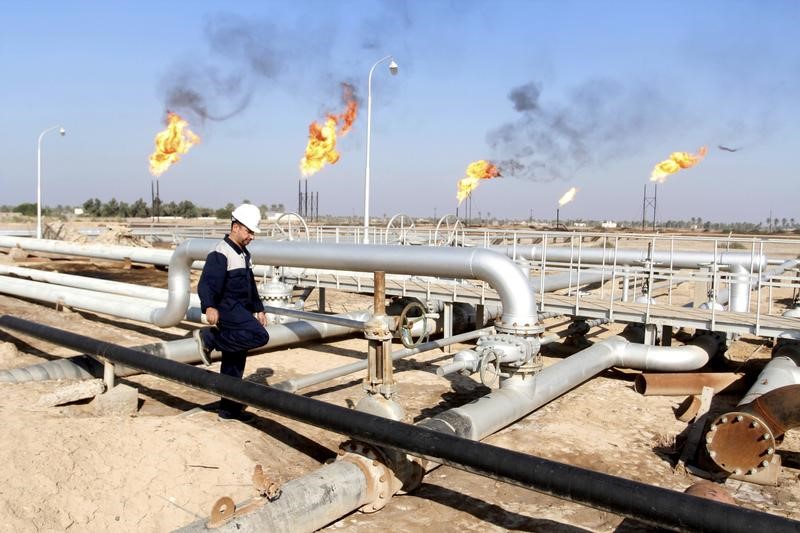By Rania El Gamal, Osamu Tsukimori and Dmitry Zhdannikov
DUBAI/TOKYO/LONDON (Reuters) - Iraq has hired Japan's Toyo Engineering (T:6330) to help build a gas pipeline to Kuwait and a related petrochemical plant as Baghdad looks to reduce flaring and finish paying reparations owed for its 1990 invasion of its neighbor.
The project, details of which have not been reported before, would allow Kuwait to diversify its gas imports in the wake a political crisis between Gulf states and major supplier Qatar.
It would also deal a blow to Royal Dutch Shell (L:RDSa), which aimed to be the dominant gas player in Iraq before relations with Baghdad soured following Shell's exit from large oil projects.
"Iraq needs to urgently reduce gas flaring as it trails behind all targets it has promised the World Bank," said a senior industry source working on the project but not allowed to discuss it publicly.
"The Kuwaiti gas project is a quick fix and an easy way to monetize gas resources."
The World Bank, which has repeatedly made reducing gas flaring a condition of lending to Baghdad, did not respond to a request for immediate comment.
Toyo is proposing to construct a gas pipeline and start deliveries after 2019, industry sources said.
Toyo's chief financial officer, Kensuke Waki, told Reuters that talks about a pipeline and a petrochemical plant were ongoing but a final investment decision had not yet been made.
Kuwait is very keen on the project and has offered a sovereign guarantee for up to 80 percent of the costs, industry sources said. No total cost has been announced.
Kuwait's oil ministry did not respond to a request for immediate comment. Oil minister Issam Al-Marzouq said last month that talks between Kuwait and Iraq were focused on a proposal to use gas to help pay Baghdad's final $4.6 billion in war compensation payments.
Iraqi oil ministry spokesman Asim Jihad said talks were focusing on price and confirmed that supplies could be used to help pay off reparations.
DIFFERENCES OVER PRICE, PLANT
Industry sources told Reuters the talks have faltered over price, however.
They said Kuwait is pushing for a price of less than $3 per mbtu (million British thermal unit), in line with U.S. Henry Hub prices. But that is less than half what Iraq pays in the north when importing gas from neighboring Iran.
"The price of gas remains the key sticking point for now," one of the sources said.
He also said both Iraq and Kuwait were pushing to have the petrochemical plant built on their territory to further capitalize on gas deliveries.
Discussions with Iraq are ongoing, a senior Kuwaiti oil industry source with knowledge of the project said, adding that it was not yet clear if gas would come from West Qurna 2 operated by Russia's Lukoil (MM:LKOH) or from Rumaila, operated by BP (L:BP).
Iraq used to supply Kuwait with gas from Rumaila. Volumes reached as much as 400 mcf per day but stopped shortly after the 1990 invasion.
More than a million claimants in Kuwait have been paid as part of Baghdad's $52.4 billion reparations bill for the invasion. But Iraq, hurt by the 2014 fall in oil prices and its war with Islamic State militants, requested a delay on the last and largest tranche, which is due this year.
CHALLENGE TO SHELL
Kuwait, although one of OPEC's leading oil producers, has struggled to meet growing domestic gas demand. The shortfall has been estimated at 500 million cubic feet per day and is being covered mainly by LNG imports, including from Qatar.
A decade ago Kuwait tried to build a pipeline from Qatar, but the move was blocked by Saudi Arabia. With relations between Riyadh and Doha worsening this year, Kuwait is looking to diversify its gas imports.
Last year, Kuwait said it would be ready to buy up to 200 mcf/day of gas from Baghdad.
Iraqi oil ministry spokesman Jihad said volumes could start at 50 mcf/d rising gradually to 200 mcf/d.
Iraq's gas reserves of 3.7 trillion cubic meters rank as 12th largest in the world but represent only a tenth of those of Iran, the world's largest.
It extracts large quantities of gas together with oil, however, and that gas is currently being flared.
Iraq’s gas development plans have long focused on the Basra gas company, a $17 billion, 25-year project in which Iraq has 51 percent, Shell owns 44 percent and Japan’s Mitsubishi Corp (T:8058) 5 percent.
The project was designed to aggregate gas from fields in the south including West Qurna 1 operated by Exxon Mobil Corp (N:XOM), Zubair operated by Italy's ENI (MI:ENI) and BP's Rumaila.
"Shell's main aim was always to develop an LNG terminal and ultimately a petchem complex in Iraq," said a Shell insider who worked on the gas project.
With Iraq refusing to agree on a gas price with Shell, the project has hit a major impasse, industry sources said. Talks have also been complicated by Shell pulling out of the Majnoon oil fields earlier this year.
"Iraq is furious at Shell and prospects don't look that great for the Basra gas company," one Iraqi industry source said.

Asked about the negotiations, both Shell and the Iraqi oil ministry said discussions were ongoing and both sides remained committed to the project.